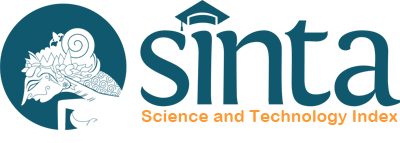Corporate Social Advocacy Communication Style on #TBSFightForSisterhood on Instagram
Abstract
Over the past years, companies have taken a new kind of social stand and publicly spoken on issues unrelated to their core business activities. The topics about gender equality rights or sexual harassment have become one of the main focuses on the corporate agenda, and companies have started advocating those issues actively. This phenomenon is then called corporate activism. This study discusses The Body Shop Indonesia's (TBSI) communication style in voicing corporate activism or corporate social advocacy through #TBSFightForSisterhood on Instagram. TBSI is engaging in corporate activism by addressing and advocating for controversial socio-political issues. This qualitative analysis study explores the themes The Body Shop Indonesia covers in its CSA communication and how The Body Shop frames CSA communication on Instagram. The analysis method used is visual and textual content analysis on Instagram. This study identified four communication frames in The Body Shop’s posts: informative, mobilizing, participatory, and aspirational. In conclusion, the most used communication style is informational, followed by mobilization, participation, and aspiration.
Keywords
Full Text:
PDFReferences
Atkinson, J. D. 2017. Journey into Social Activism: Qualitative Approaches. NY: Fordham University Press
Bangun, C. R. (2016). Peran Departemen Corporate Communication dalam Melakukan Sosialisasi Nilai Perusahaan melalui Media Internal. Ultimacomm: Jurnal Ilmu Komunikasi, 8(2), 45-56.
Baur, D., & Wettstein, F. 2016. CSR’s new challenge: Corporate political advocacy. In M. C. C.
Arruda & B. Rok (Eds.), Understanding ethics and responsibilities in a globalizing world, 171–
Cham: Springer.
Chatterji, A. & Toffel, M. W. 2017. Do CEO activists make a difference? Evidence from a quasi-field experiment. Working Paper No. 16-100. Harvard Business School. DOI: 10.2139/ssrn.2742209
den Hond, F., Rehbein, K.A., de Bakker, F.G.A., and Kooijmans-van Lankveld, H. 2014. Playing on Two Chessboards: Reputation Effects between Corporate Social Responsibility (CSR) and Corporate Political Activity (CPA)
London, M and Morfopoulous, Richard G. 2012. Social Entrepreneurship: How to Start Successful Corporate Social Responsibility and Community-Based Initiatives for Advocacy and Change.
Kettunen, Salla. 2020. Corporate Activism – New Kid on the CSR Block: Perceptions of Social Justice in Starbucks’ Corporate Activism Discourses.
Kusuma, S., & Bangun, C. R. A. (2021). Crisis Responsibility Impact on Customer Loyalty Eiger through Post-Crisis Reputation. Jurnal Komunikasi Global, 10(2), 214-228.
Maon, F., Lindgreen, A., & Swaen, V. (2010). Organizational Stages and Cultural Phases: A Critical Review and a Consolidative Model of Corporate Social Responsibility Development. International Journal of Management Reviews, 12(1), 20–38. doi:10.1111/j.1468-2370.2009.00278.x
Nwagbara, U., & Belal, A. (2019). Persuasive language of responsible organization? A critical discourse analysis of corporate social responsibility (CSR) reports of Nigerian oil companies. Accounting, Auditing & Accountability Journal, 32(8)
Olkkonen, Laura, Jääskeläinen, Jannica. 2019. Corporate Activism: Exploring Corporate Social Responsibility (CSR) Communication. Academy of Management Annual Meeting Proceedings
Prasad, A., & Holzinger, I. (2013). Seeing through smoke and mirrors: A critical analysis of marketing CSR. Journal of Business Research, 66(10), 1915–1921
Roper, S., & Fill, C. (2012). Corporate Reputation. Pearson International Content.
Sarkar, C. & Kotler, P. 2018. Brand activism: From purpose to action. Idea Bite Press.
Scherer, A.G., Rasche, A., Palazzo, G. & Spicer, A. 2016. Managing for political corporate social
responsibility: New challenges and directions for PCSR 2.0. Journal of Management Studies, 53 (3): 273-298
DOI: http://dx.doi.org/10.22441/visikom.v23i01.23145

This work is licensed under a Creative Commons Attribution-ShareAlike 4.0 International License.
Jurnal Visi Komunikasi [p-ISSN 1412-3037 | e-ISSN 2581-2335]
Fakultas Ilmu Komunikasi Universitas Mercu Buana
Jl. Raya Meruya Selatan, Kembangan, Jakarta 11650
Tlp./Fax: +62215870341
http://publikasi.mercubuana.ac.id/index.php/viskom

This work is licensed under a Creative Commons Attribution-NonCommercial 4.0 International License.
Jurnal Visi Komunikasi was indexed by :





